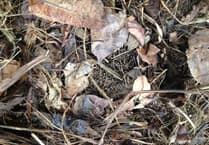In this week’s column, ManxSPCA general manager discusses the hidden hazard presented by dog saliva and introduces us to the charity’s own ‘slobber chops’...
A dog’s unwavering love of his or her owner is usually one of the best aspects of dog ownership, unlike most cats who pick and choose when they show affection. The dog:owner bond can be very demonstrative and include kisses and cuddles, but two recent dog saliva related deaths should make us think twice about being licked by our canine companions.
The first death was of an 83-year-old lady who suffered a minor fall in her home in Norfolk in June and scratched her leg. Her granddaughter came to visit her accompanied by her pet dog and all seemed well, but the next day the lady felt unwell and was taken to hospital where she died seven days later. Her cause of death was septic shock most likely caused by a dog lick transmitting the bacteria Pasteurella multocida and causing a fatal infection. Pasteurella multocida is present in about fifty percent of dogs and usually does no harm.
This follows the death from the same bacteria of an 85-year-old lady who is thought to have been licked by her own dog. Cases such as these are very rare but people with frail health or who are immune compromised should be extra careful around dogs. Even healthy people should observe good hygiene measures when enjoying canine cuddles, and discourage a dog licking them around their eyes, nose or mouth where the mucous membranes are more permeable than regular skin and prone to absorbing bacteria.
A small wound is also thought to have been the reason a lady from Barnsley died from rabies in June. She had been on holiday in Morocco with her family and had stroked a stray puppy, which left her with a barely detectable scratch. Two weeks after she returned home she started to feel unwell, and she died three months later.
Medical advice is that if you are travelling abroad you should get the vaccinations you need to protect you from diseases that are prevalent in certain countries – this includes a rabies injection if you’re travelling to most parts of Africa or Asia. If you are bitten, scratched or even just licked by an animal in a high-risk country you should wash your skin straight away and seek medical advice.
Early treatment of rabies is usually effective, but once the disease sets in then it attacks the nerves and brain and can’t be cured. There have been six cases in the UK of human rabies connected to animal exposure abroad since 2000, and so whilst the probability of catching rabies is low, the outcome is potentially fatal.
We have our very own ‘slobber chops’ in the form of Bruno, a two-year-old standard poodle/Newfoundland cross. But don’t let a few drops of saliva put you off him because he is simply the most friendly and easy-going dog you will ever meet, and he’s handsome too. He is a gentle giant and far more companiable and even-natured than some of the smaller dogs we have in our rescue kennels.
We have several large, young dogs with us at the moment, with more due to arrive, and so we are actively seeking potential owners who prefer big dogs. Home finder questionaries can be found on our website (www.manxspca.com) and they can now be completed online.
Bruno is a great mixture of breeds – he’s not flat-faced, he doesn’t have skin folds, he isn’t likely to suffer from hip dysplasia, and he doesn’t have any allergies. This can’t be said of many popular breeds such as French bulldogs and pugs. Surely it’s better to have a large healthy dog with a good temperament than a small genetically compromised one?
So, if you have the time and space in your life and your home, please come and meet Bruno and the other dogs like him.
.jpg?width=455)



